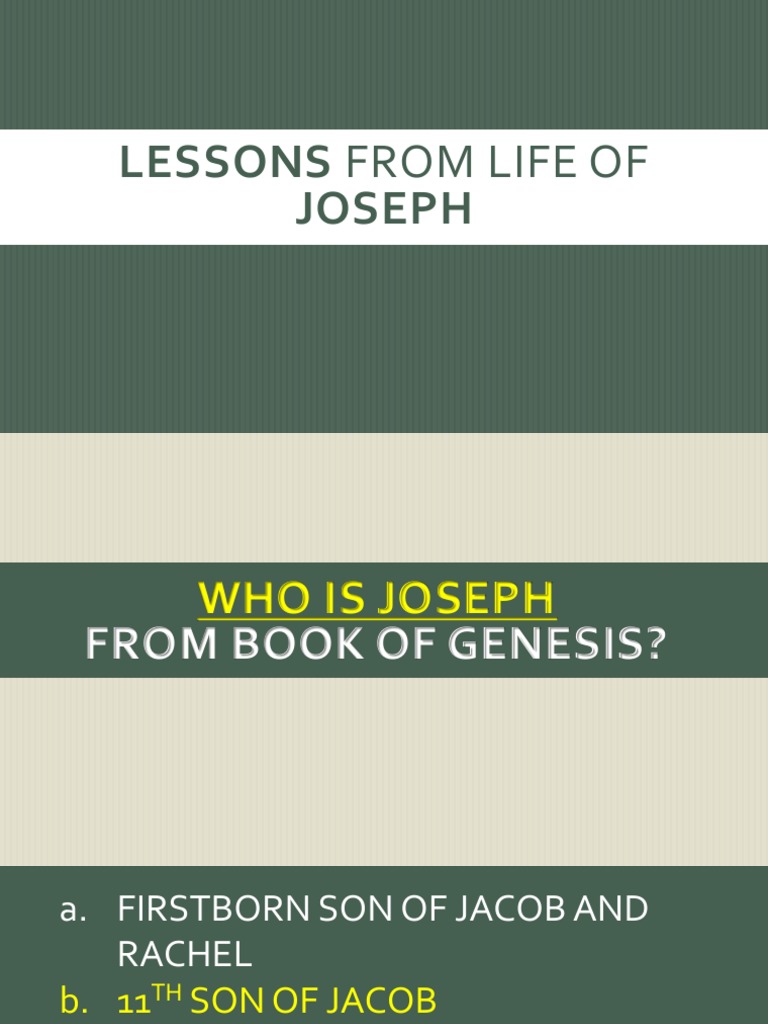Throughout the annals of religious and philosophical thought, the narrative of Joseph—found prominently in several sacred texts—has captivated the hearts and minds of believers and scholars alike. This ancient story not only delineates the trials and tribulations of a young man favored by his father but also serves as an archetype for the broader Bahá’í teachings. Through the lens of Bahá’í principles, the story of Joseph reveals profound insights about resilience, forgiveness, and the interconnectedness of humanity.
To fully appreciate the lessons embedded within Joseph’s narrative, one must first examine the pivotal moments that outline his life. Joseph, the favored son of Jacob, embodies the trials of jealousy and betrayal when his brothers conspire against him, ultimately leading to his enslavement in Egypt. His experiences serve as a juxtaposition against societal standards, shedding light on the Bahá’í principle of unity in diversity. The enmity within Joseph’s family reverberates through time, prompting reflections on how conflicts, often rooted in envy, can lead to profound fragmentation within communities.
Equally significant is Joseph’s unwavering fidelity to his ethical beliefs despite the adversities he encounters. As he rises from slavery to become a trusted advisor to Pharaoh, the narrative underscores a vital lesson in perseverance and integrity. The Bahá’í faith emphasizes the power of the individual to transcend their circumstances through virtuous deeds and unwavering faith in God. Joseph’s ability to maintain his character in the face of betrayal illuminates the crucial Bahá’í tenet that personal virtues are essential to societal progress.
Furthermore, the story of Joseph prompts an exploration of the theme of forgiveness, a central tenet in many religious frameworks, including the Bahá’í teachings. The climactic reunion with his brothers serves as a testament to the transformative power of forgiveness. In a world rife with discord, the ability to forgive and reconcile is paramount. The narrative encourages us to seek understanding instead of resentment, fostering a culture of dialogue and compassion over divisiveness. When Joseph forgives his brothers, he embodies the Bahá’í ideal that every individual has the potential for redemption and transformation.
One cannot overlook the importance of dreams in Joseph’s story. From his prophetic dreams of grandeur to the interpretations of Pharaoh’s dreams that ultimately save Egypt from famine, dreams serve as a potent metaphor for vision and foresight. The Bahá’í teachings advocate for the cultivation of a broader perspective, urging individuals to envision and strive for a future characterized by harmony and cooperation. Just as Joseph’s insights provided sustenance to a nation, the Bahá’í faith encourages its followers to contribute to the betterment of society through enlightened thought and innovative solutions to contemporary dilemmas.
Moreover, the narrative illustrates the principle of the oneness of mankind, a cornerstone of Bahá’í teachings. Joseph’s rise in Egypt, a land foreign to him, signifies the universality of the human spirit. Through adversity and subsequent elevation, Joseph becomes a catalyst for unity among disparate groups. The Bahá’í emphasis on the oneness of humanity calls for the dismantling of barriers that divide people, urging individuals to embrace diversity as a source of strength rather than division. Through Joseph’s encounters with the Egyptians, we are reminded to foster an attitude of inclusivity and acceptance toward all individuals, irrespective of their backgrounds.
The trajectory of Joseph’s life also highlights the intricate interplay of divine providence and human agency. Despite his harrowing tribulations, Joseph’s story illustrates that our trials are often stepping stones to greater wisdom and purpose. The Bahá’í perspective posits that every individual possesses the innate capacity to infuse their lives with meaning, even amidst adversity. The narrative beckons us to ponder the significance of our life experiences in crafting our destinies, often steering us toward unforeseen avenues of growth and development.
As we delve deeper into the story of Joseph, it invites us to contemplate the role of patience in the face of life’s unpredictable nature. Patience emerges as a pivotal virtue throughout Joseph’s encounters, particularly during his incarceration and subsequent liberation. The Bahá’í teachings extol patience as a transformative quality, one that fosters resilience and equips individuals to navigate the vicissitudes of life with grace. Through the contemplation of Joseph’s journey, we glean the wisdom that patience is not merely passive endurance but a proactive engagement with faith and purpose.
The story of Joseph further reveals an important lesson about the impact of suffering on the human condition. Joseph’s trials serve as a crucible for character development, demonstrating that hardship often cultivates empathy and understanding. The Bahá’í teachings accentuate the necessity of collectively addressing the plight of those in suffering, advocating for a proactive engagement with social justice. Joseph’s eventual elevation to a position of power empowers him to act as a steward for his people. This resonates with the Bahá’í call to service, urging every individual to contribute to alleviating the suffering of others, thereby promoting social cohesion and solidarity.
In conclusion, the story of Joseph resonates deeply within the framework of Bahá’í teachings, offering a mosaic of values that have persisted through time. From resilience and forgiveness to the oneness of humanity and the importance of patience, these lessons beckon individuals to cultivate an elevated perspective on life’s challenges. By embodying the principles drawn from Joseph’s journey, we can forge a more compassionate and unified society, bridging the divides that often fragment our communities. Thus, the narrative encourages us to embrace our shared humanity, fostering a spirit of curiosity and openness that transcends the boundaries of our experiences.
